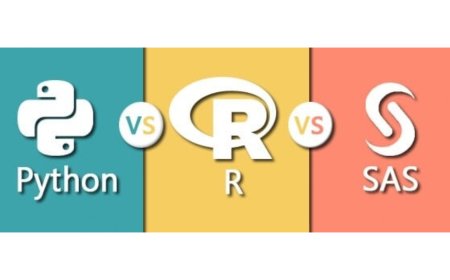Explore: Data Science in India
Explore the landscape of Data Science in India: trends, opportunities, and challenges for professionals and businesses in the fast-growing field

Data science in India has grown significantly in recent years, owing to the country's rapid digitization and the availability of massive amounts of data. Organizations across various sectors, including finance, healthcare, e-commerce, and manufacturing, are leveraging data science techniques to gain valuable insights, improve decision-making processes, and drive business outcomes. The demand for skilled data scientists in India has surged as companies recognize the importance of extracting actionable insights from data to stay competitive in today's data-driven economy. With India emerging as a global hub for technology and innovation, the field of data science continues to evolve, offering promising career opportunities for individuals with the right skills and expertise.
What is the essence of data science?
Data science is a field that involves collecting, analyzing, and interpreting large amounts of data to gain insights and solve complex problems. It combines elements of mathematics, statistics, computer science, and domain knowledge to extract meaningful patterns and predictions from data. Data science equips individuals with the skills and tools necessary to work with data in diverse industries, such as finance, healthcare, marketing, and technology. It prepares them to tackle real-world challenges by leveraging data-driven insights to make informed decisions and drive innovation.
A course in data science typically covers various topics such as statistical analysis, machine learning, data visualization, and programming languages like Python or R. Students learn how to manipulate data, apply algorithms to uncover patterns, and create models to make predictions. Additionally, they learn how to interpret results and communicate findings effectively to stakeholders.
Job outlook in data science professionals
Data science in India is booming, with promising growth projections. The field is expected to expand rapidly in the coming years due to the increasing adoption of digital technologies across industries. With businesses recognizing the importance of data-driven decision-making, there's a growing demand for skilled data scientists who can unlock insights from vast amounts of data. In various fields like IT, finance, healthcare, and online shopping, there's a strong need for data scientists. They're the ones who help companies use their data to improve operations, make customers happier, and stay competitive. Whether it's a small startup or a big corporation, everyone wants data scientists on their team.
What do data scientists do?
As technology keeps changing, data scientists need to keep learning new stuff like AI and machine learning. Also, it's super important to make sure people's data is safe and used ethically. So, data scientists need to keep studying and getting better to keep up with all these changes and stay important in the world of data science.
Data scientists are like modern-day detectives who use their skills to explore and make sense of large sets of data. They dig deep into the data to find valuable insights that can help businesses make better decisions. This involves analyzing patterns, trends, and relationships within the data to uncover useful information. Essentially, data scientists help companies understand their data better so they can solve problems and improve their operations.
Responsibilities and Tasks of Data Scientists
The key responsibilities and tasks of data scientists are:
-
Data collection: Data scientists gather information from various sources, such as databases, spreadsheets, or online platforms. They ensure the data is relevant to the problem they're trying to solve.
-
Data Cleaning: Often, data isn't perfect. It might have errors, missing values, or inconsistencies. Data scientists clean up this messy data to make sure it's accurate and ready for analysis.
-
Data Analysis: This is where the magic happens. Data scientists use statistical methods and machine-learning algorithms to analyze the data. They look for patterns, trends, and correlations that can provide valuable insights.
-
Model Building: Data scientists build predictive models based on their analysis. These models use past data to make predictions about future events. For example, predicting customer behavior or sales trends.
-
Model Evaluation: Once a model is built, data scientists test it to see how well it performs. They assess its accuracy and make any necessary adjustments to improve its performance.
-
Visualization: Data scientists often create visual representations of their findings, such as charts or graphs. This makes it easier for others to understand the data and the insights derived from it.
-
Communication: Finally, data scientists communicate their findings to stakeholders clearly and understandably. This could be through presentations, reports, or meetings. They help others in the organization make informed decisions based on the data analysis.
Real-world applications across industries:
Data science is everywhere, helping businesses in many ways. In healthcare, it's used to predict diseases and improve patient care. Finance relies on data science for stock market predictions and detecting fraud. Online shopping platforms use it to recommend products to customers, while transportation systems optimize routes with its help. Marketing campaigns become more effective through data analysis, and energy companies use it to save resources and prevent equipment failures.
Education and skills required
Technical skills refer to the specific abilities and knowledge required to perform tasks related to a particular field or profession. In the context of data science, technical skills encompass expertise in various tools and techniques used to analyze and interpret data. Here's a breakdown of the techniques needed for success in data science:
-
Programming Languages: Data scientists need to be proficient in programming languages like Python or R, which are commonly used for data analysis and modeling. These languages allow data scientists to manipulate data, implement algorithms, and create visualizations.
-
Statistical Analysis: Understanding statistical methods is crucial for data scientists to make sense of data and draw meaningful conclusions. This includes knowledge of probability theory, hypothesis testing, regression analysis, and other statistical techniques used to analyze data distributions and relationships.
-
Machine Learning: Machine learning is a subset of artificial intelligence that focuses on developing algorithms and models that can learn from data and make predictions. Data scientists need to have a solid understanding of machine learning concepts, such as supervised learning, unsupervised learning, and reinforcement learning, as well as experience in applying machine learning algorithms to real-world data sets.
Salary of data scientists
Data scientist positions are among the highest-paying careers in India, with annual wages ranging from 1,000,000 to 2,000,000 rupees, according to Glassdoor. This lucrative pay scale reflects the high demand for skilled professionals in the field of data science.
The choice of where one works can greatly influence the paycheck they receive. Traditionally, tech hotspots like Mumbai and Bangalore tend to offer more lucrative salaries owing to the abundance of tech firms and elevated living expenses. However, the rise of cities such as Hyderabad as alluring destinations for global corporations hints at a potential shift in pay dynamics. Giants like Facebook, Microsoft, Google, Amazon, and P&G have already set up shop in Hyderabad, extending attractive compensation packages and broadening the scope for data scientists to thrive in their careers.
As the demand for data-driven insights continues to grow across industries, the role of data scientists becomes increasingly pivotal. Hence, aspiring data scientists in India can anticipate promising career prospects and substantial financial rewards in the field.
Data scientists are hiring industries
Data scientists are sought after in diverse sectors where data-driven decision-making is crucial for success. Here are some key industries actively recruiting data scientists:
-
Flipkart: Based in Bangalore, Flipkart is India's leading e-commerce platforms
-
Amazon India: With offices in cities like Bangalore, Hyderabad, and Chennai, data scientists work on various projects related to e-commerce, cloud computing, and artificial intelligence.
-
Tata Consultancy Services (TCS), in Mumbai, is one of the largest IT services companies in India, including finance, healthcare, and retail.
-
Wipro: In Bangalore, Wipro is a prominent IT company that works on projects related to data analytics, artificial intelligence, and digital transformation.
-
Microsoft India-inn cities like Bangalore, Hyderabad, and Gurgaon, in areas such as cloud computing, artificial intelligence, and data analytics.
-
Infosys: Infosys, in Bangalore, provides technology and outsourcing services on analytics and data-driven solutions for its clients.
In conclusion, the future of data science in India is incredibly promising, with an estimated 700,000 job openings and a substantial growth forecast of $249,147.71 million by 2027. As businesses increasingly rely on data-driven insights, the demand for skilled professionals will continue to soar, offering abundant career opportunities. With India's ongoing digital transformation, aspiring data scientists have a bright and rewarding journey ahead, poised to make significant contributions to innovation across various sectors in the country and beyond.




































